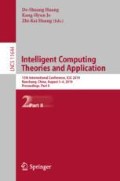Abstract
Nowadays, plenty of evidence indicates that microRNAs (miRNAs) can result in various human complex diseases and may be as new biological markers to diagnose specific diseases. The reality is that biological experimental corroboration of disease-related miRNAs is time consuming and laborious. Therefore, the calculation methods for recognizing the potential relationship between the miRNA and the disease have become an increasingly significant hot topic in the world. In this paper, we exploited an improved calculation method based on inductive matrix completion to predict disease related miRNAs (IIMCMP). Firstly, we construct miRNA-disease adjacency matrix by adopting verified miRNA-disease associations. In addition, the proposed approach uses the three matrices, including the disease-miRNA association matrix, the integrated disease similarity matrix and the miRNA functional similarity matrix. Secondly, considering new diseases or new miRNAs, it is necessary to preprocess the adjacency matrix of biologically validated associations between diseases and miRNAs, so we calculate the interaction profile between miRNAs and diseases to update adjacency matrix of miRNA-disease association. Finally, inductive matrix completion algorithm is adopted to predict the probability score on the heterogeneous network between miRNAs and diseases. As a result, IIMCMP gained the AUC of 0.9016 which adopted new interaction likelihood profiles in the leave-one-out cross validation. In addition, two case studies and leave-one-out cross validation demonstrated that IIMCMP can achieve predominant and reliable performance assessment.
Access this chapter
Tax calculation will be finalised at checkout
Purchases are for personal use only
References
Ribeiro, A.O., Schoof, C.R., Izzotti, A., Pereira, L.V., Vasques, L.R.: MicroRNAs: modulators of cell identity, and their applications in tissue engineering. MicroRNA 3(1), 45–53 (2014)
Lee, R.C., Feinbaum, R.L., Ambros, V.: The C. elegans heterochronic gene lin-4 encodes small RNAs with antisense complementarity to lin-14. Cell 75(5), 843–854 (1993)
Chen, X., Yan, C.C., Zhang, X.: WBSMDA: within and between score for MiRNA-disease association prediction. Sci Rep. 6(1), 21106 (2016)
Xu, J., et al.: Prioritizing candidate disease MiRNAs by topological features in the MiRNA target dysregulated network: case study of prostate cancer. Mol. Cancer Ther. 10(10), 1857–1866 (2011)
Chen, X., Yan, C.C., Zhang, X., You, Z.H., Huang, Y.A., Yan, G.Y.: HGIMDA: heterogeneous graph inference for miRNA-disease association prediction. Oncotarget 7(40), 65257–65269 (2016)
Wang, D., Wang, J.A.: Inferring the human microRNA functional similarity and functional network based on microRNA-associated diseases. Bioinformatics 26(13), 1644–1650 (2010)
Chen, X., You, Z.H., Yan, G.Y., Gong, D.W.: IRWRLDA: improved random walk with restart for lncRNA-disease association prediction. Oncotarget. 7(36), 57919–57931 (2016)
Chen, X., Liu, M.X., Yan, G.Y.: RWRMDA: predicting novel human microRNA-disease associations. Mol. BioSyst. 8(10), 2792–2798 (2012)
Ezzat, A., Zhao, P., Wu, M., Li, X., Kwoh, C.K.: Drug-target interaction prediction with graph regularized matrix factorization. IEEE/ACM Trans. Comput. Biol. Bioinform. 11(99), 646–656 (2017)
Jain, P., Dhillon, I.S.: Provable inductive matrix completion. Computer Science (2013)
Linehan, W.M., Grubb, R.L., Coleman, J.A., Zbar, B., Walther, M.C.M.: The genetic basis of cancer of kidney cancer: implications for gene-specific clinical management. BJU Int. 95(s2), 2–7 (2005)
Siegel, R., Naishadham, D., Jemal, A.: Cancer statistics, 2012. CA Cancer J. Clin. 62(1), 10–29 (2012)
Acknowledgement
This work was supported by grants from the National Natural Science Foundation of China (No. 61873001), the Key Project of Anhui Provincial Education Department (No. KJ2017ZD01), and the Natural Science Foundation of Anhui Province (No. 1808085QF209).
Author information
Authors and Affiliations
Corresponding author
Editor information
Editors and Affiliations
Rights and permissions
Copyright information
© 2019 Springer Nature Switzerland AG
About this paper
Cite this paper
Ding, X., Xia, JF., Wang, YT., Wang, J., Zheng, CH. (2019). Improved Inductive Matrix Completion Method for Predicting MicroRNA-Disease Associations. In: Huang, DS., Jo, KH., Huang, ZK. (eds) Intelligent Computing Theories and Application. ICIC 2019. Lecture Notes in Computer Science(), vol 11644. Springer, Cham. https://doi.org/10.1007/978-3-030-26969-2_23
Download citation
DOI: https://doi.org/10.1007/978-3-030-26969-2_23
Published:
Publisher Name: Springer, Cham
Print ISBN: 978-3-030-26968-5
Online ISBN: 978-3-030-26969-2
eBook Packages: Computer ScienceComputer Science (R0)

